Facts about Austria
Austria is a country that lies in Central Europe. It is one of the most beautiful countries and its terrain is highly mountainous. Austria is a landlocked country bordered by eight countries. German is its official language and Vienna is the capital city of this country. Similarly, Euro is its official currency. In this article, we will discuss some amazing facts about Austria. Let go.
Austria Quick Facts
The official name of Austria: The Republic of Austria
Area: 83,871 square km
Population(2020): 8.935 million
Population density: 106 per km Sq
GDP (PPP)(2018): $461.432 Billion
GDP Per Capita: $47,700
Continent: Europe
Capital: Vienna
Language: Hungarian, Burgenland, Croatian, Slovene
Official Languages: Austrian German
Largest by area: 113th largest country
Religion: Christianity: 69.0%, Other: 1.1%, No religion: 22%, Islam: 7.9%
Government: Federal Parliamentary republic
Currency: Euro
Time Zone: UTC+1 (CET), UTC+2 (CEST)
30 amazing Facts about Austria
1. The landlocked country in Europe
Austria is a largely mountainous country and as well as landlocked country that lies in south-central Europe. Luxembourg, Switzerland, and Austria are some of the landlocked countries in Europe.
Austria is the smallest country in Europe and it extends 360 miles from east to west.
2. Bordering countries of Austria
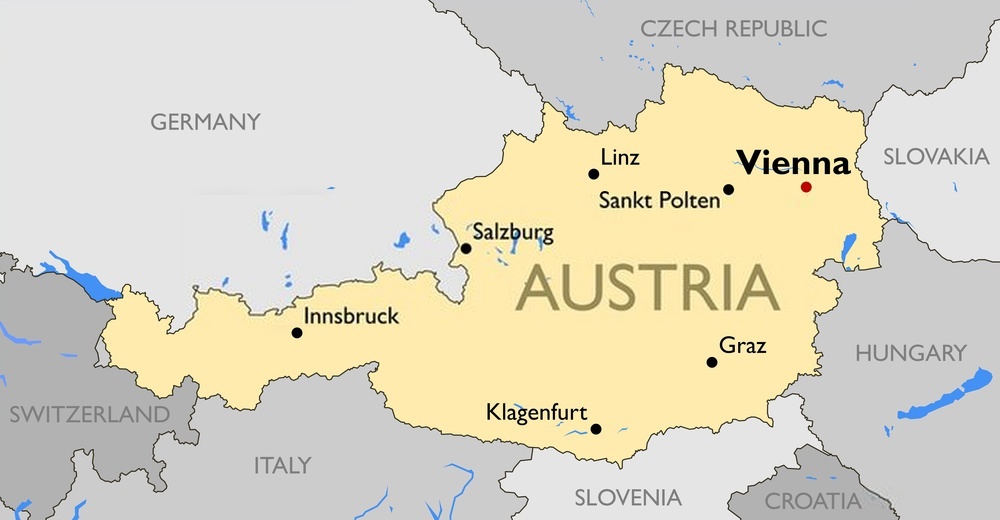 Austria is bordered by eight countries such as Germany, the Czech Republic, Slovakia, Slovenia, Italy, Liechtenstein, Hungary, and Switzerland.
Austria is bordered by eight countries such as Germany, the Czech Republic, Slovakia, Slovenia, Italy, Liechtenstein, Hungary, and Switzerland.
Austria shares its longest border with Germany. Approximately 800 Kilometers of border of Austria touch with Germany.
3. The Federal States in Austria
Austria has nine federal States that are Vienna, Burgenland, Salzburg, Styria, Lower Austria, Upper Austria, Tyrol, Vorarlberg, and Carinthia.
4. The country is the centre of Austro Hungarian empire
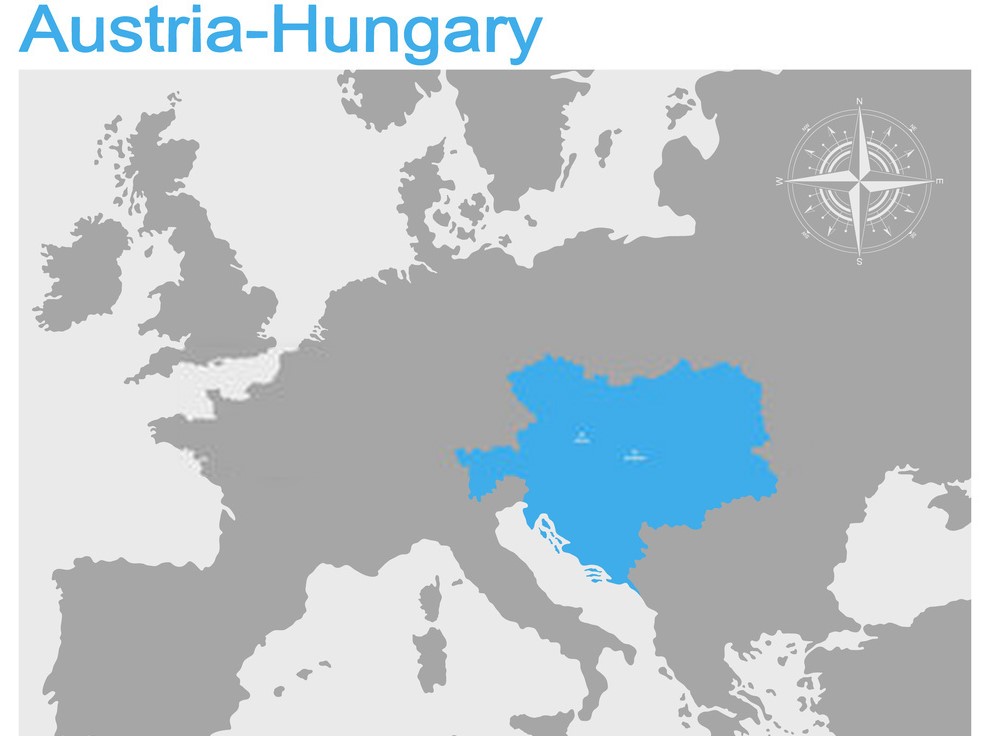 At once, Austria was the central power for the large Austro-Hungarian Empire. After world war I the country was reduced to a small republic. World war I conducted on (28 Jul 1914- 11 Nov 1918).
At once, Austria was the central power for the large Austro-Hungarian Empire. After world war I the country was reduced to a small republic. World war I conducted on (28 Jul 1914- 11 Nov 1918).
After the collapse of the Austro-Hungarian Empire in 1918. The country faces lots of problems such as social and economic for more than 25 years.
Similarly, during the 17th and 18th, Austria was a great power country in Europe.
5. Austria is the home of Celtic Tribes
At the time of Pre-Roman, many Celtic Tribes lives in Austria. It is said that Austria is the home to Celtic Tribes.
6. Austria Becomes Independent
On October 26, 1955, Austria become independent. Between 1938 and 1945 the country was under Nazi Germany. Similarly, Allied forces controlled Austria from 1945 to 1955 and On October 26, 1955, the country become independent.
7. First postcard issued to country
Austria is the first country in the world that issue postcards.
8. The capital city of Austria involve in major wars
The capital city of Austria is Vienna and Vienna was involved in nine major wars in the 19th century. During those periods (19th century) the average life expectancy was about 38 years in Vienna.
9. Viennese Clock Museum
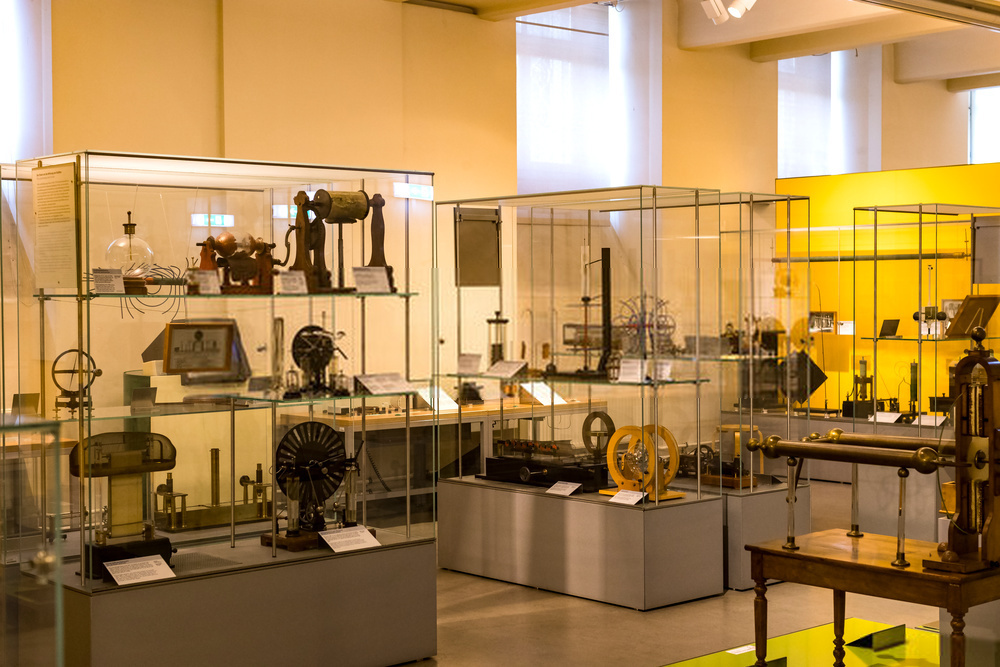 One of the popular Museums in Austria is the Viennese Clock Museum where more than 1,000 clocks had kept. The Museum has an astronomical clock that was built in 1979 and is one of the main attractions of the Viennese Clock Museum.
One of the popular Museums in Austria is the Viennese Clock Museum where more than 1,000 clocks had kept. The Museum has an astronomical clock that was built in 1979 and is one of the main attractions of the Viennese Clock Museum.
10. World major Libraries
The Austrian National Library which is located in Vienna is one of the World's major libraries. The Austrian National Library was completed in 1726 and the library has a collection dating back to the 14th century. Today, more than 2.5 million books are in the Austrian National Library.
11. The highest point in Austria
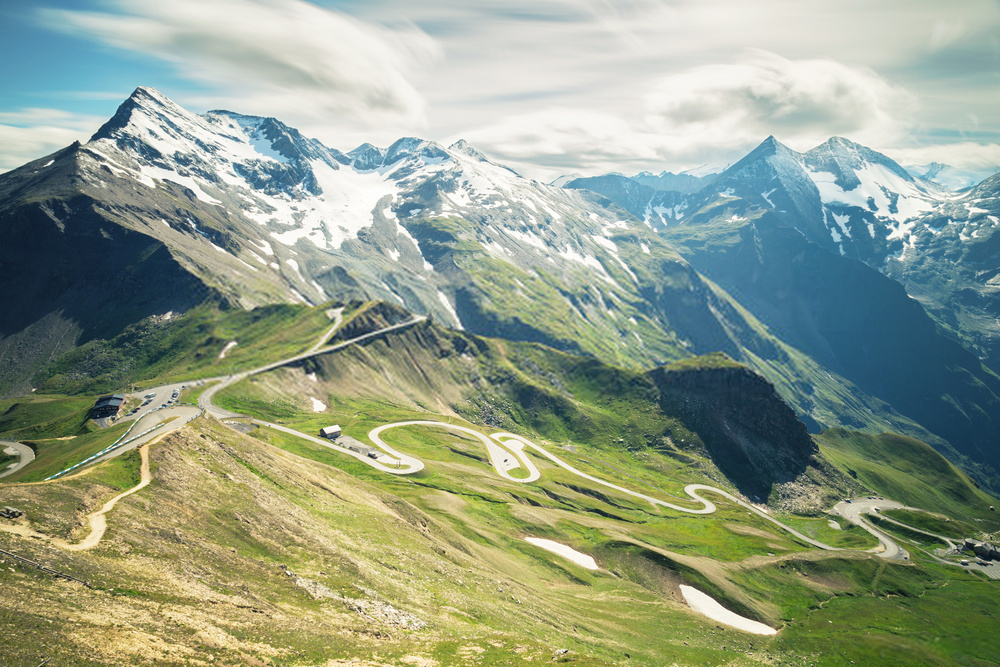 The highest point in Austria is the Grossglockner which is at 3,798 meters. Austria has 13 peaks above 3,000 meters and 34 above 2,000 meters.
The highest point in Austria is the Grossglockner which is at 3,798 meters. Austria has 13 peaks above 3,000 meters and 34 above 2,000 meters.
12. The sewing machine was invented in Austria
The sewing machine was invented by Josef Madersperger in Austria.
13. Agriculture of Austria
 Only a very small percentage of the people in Austria are involved in Agriculture. Less than 1.5% of the GDP is the share of Agricultural production. 45 acres is the average size of a farm in Austria.
Only a very small percentage of the people in Austria are involved in Agriculture. Less than 1.5% of the GDP is the share of Agricultural production. 45 acres is the average size of a farm in Austria.
Similarly, Austria is also considered the number one organic farming country in Europe. The Agricultural product is high quality and Austrians emphasize quality rather than quantity.
Furthermore, Government also promotes the reduction in the use of chemical fertilizers and pesticides.
Austrians people reject the use of biotechnology for the production of crops. People highly focus on natural and organic farms. Besides that, it is also the first country in the world that register the first organic farm.
In 1927, the world's first organic farm was registered in Austria. Furthermore, the country is the first in the world that establish national regulations for organic farming.
14. Largest Natural Lake in Austria
 Lake Neusiedl is the largest natural lake in Austria. It is 36 kilometres long and the surface area of the Lake is 315 square kilometres.
Lake Neusiedl is the largest natural lake in Austria. It is 36 kilometres long and the surface area of the Lake is 315 square kilometres.
Also, read; the interesting facts about Asia.
15. High use of Renewable energy
More than 70% of its electricity has come from renewable energy sources in Austria. It is one of the top countries in Europe to use highly renewable energy.
16. Largest Austrian River Port
 The port of Vienna is the largest Austrian river port. Similarly, it is one of the largest ports on the Danube River. The annual traffic capacity of the port of Vienna is around 12 million tonnes of cargo.
The port of Vienna is the largest Austrian river port. Similarly, it is one of the largest ports on the Danube River. The annual traffic capacity of the port of Vienna is around 12 million tonnes of cargo.
17. Popular Sports activities in Austria
The most popular sports activities in Austria are Soccer, Dancing, Volleyball, Ballet, and Basketball.
18. The world's largest Emerald
The world's largest Emerald is in Austria. It has 2860 Carats diamonds.
19. Austria lies as Schengen Countries
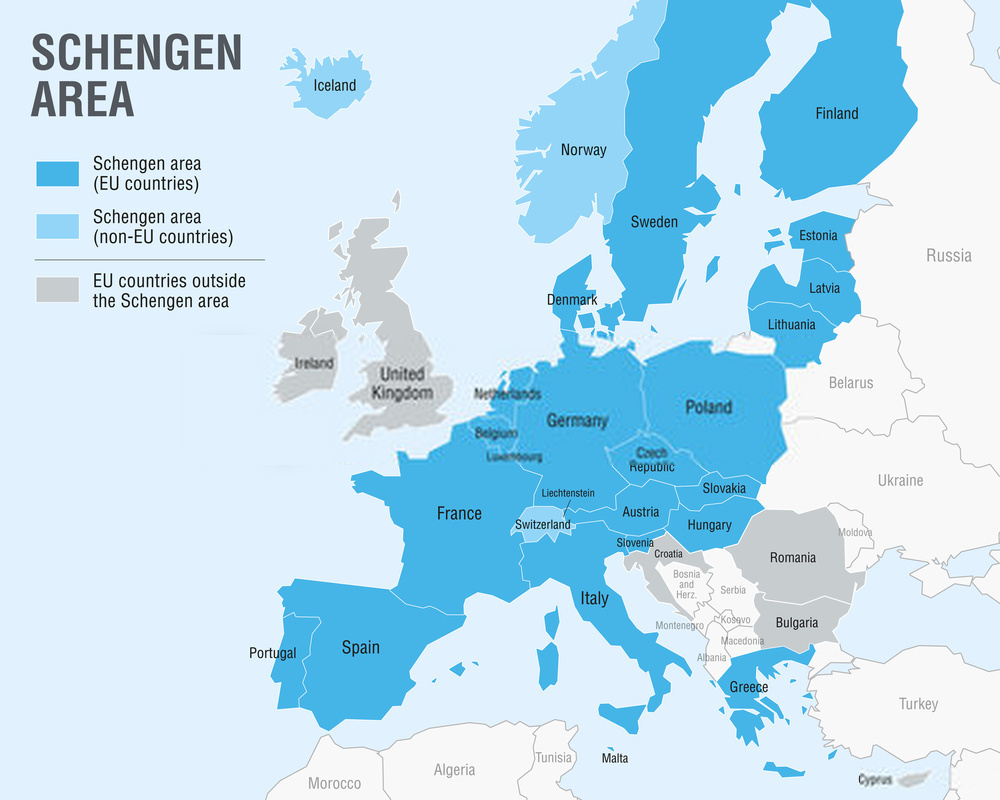 There are 26 Schengen countries. They are Austria, Belgium, Germany, Greece, Finland, France, Denmark, Czech Republic, Estonia, Malta, Luxembourg, Hungary, Lithuania, Iceland, Italy, Liechtenstein, Latvia, the Netherlands, Switzerland, Slovenia, Spain, Sweden, Norway, Poland, Portugal, and Slovakia. This Schengen Countries passport and all other types of border control at the mutual. The border for these 26 countries is not implemented.
There are 26 Schengen countries. They are Austria, Belgium, Germany, Greece, Finland, France, Denmark, Czech Republic, Estonia, Malta, Luxembourg, Hungary, Lithuania, Iceland, Italy, Liechtenstein, Latvia, the Netherlands, Switzerland, Slovenia, Spain, Sweden, Norway, Poland, Portugal, and Slovakia. This Schengen Countries passport and all other types of border control at the mutual. The border for these 26 countries is not implemented.
The population of these Schengen countries around 400 million operates very much like a single state for international travel purposes. The people can easily go to any Schengen country if they are citizens of 26 Schengen countries.
Also, read; North America and its interesting facts.
20. The Largest Ice Cave System
Eisriesenwelt the largest ice cave system in the world belongs to Austria. It is located in Werfen about 40 km south of Salzburg. Every year more than 200,000 tourists visit the ice cave.
21. World's Oldest Zoo
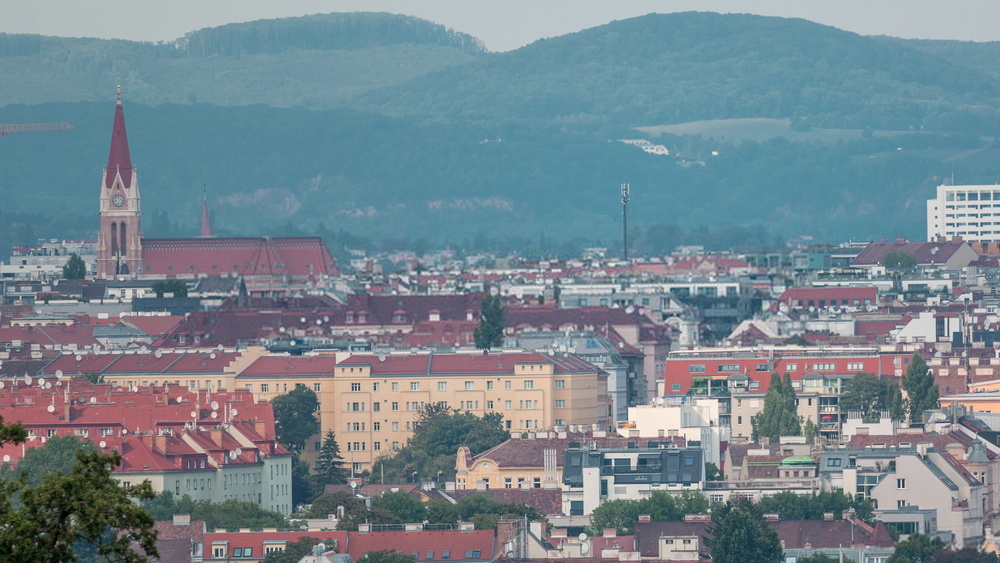 The Tiergarten Schonbrunn is the world's oldest zoo that lies in Austria. This zoo is located on the grounds of the famous Schonbrunn Palace in Vienna and it was founded in 1752.
The Tiergarten Schonbrunn is the world's oldest zoo that lies in Austria. This zoo is located on the grounds of the famous Schonbrunn Palace in Vienna and it was founded in 1752.
More than 700 animal species are kept in the zoo. Some of them are endangered. The main purpose of this zoo is to provide shelter for species and for general nature conservation.
22. High Acid Rainfall in Austria
Acid Rainfall is one of the major issues in Austria. More than 37% of the forest of the country is damaged by acid rain.
23. Exports the wine
Austria exports around 30% of the wine that is produced in the country. It is one of the high exporters of wine in Europe.
24. Highest Per Capita Income from Tourism
Austria earns a high amount of money from the tourism sector. It has the third-highest per capita income from tourism in the Schengen countries as well as in the European Union. Every year more than 30 million tourists visit Austria.
Similarly, it is one of the richest countries the per capita people. Austria's GDP Per Capita is $ 47,00.
25. Austria adopts the Euro
 In 1995 Austria becomes a member of the European Union. On 1 January 1999, Austria adopted the Euro. Similarly, on 1 January 2002, euro banknotes and coins were introduced in Austria. Furthermore, on 28 February 2002, the Schilling and the euro legal tender status was ended.
In 1995 Austria becomes a member of the European Union. On 1 January 1999, Austria adopted the Euro. Similarly, on 1 January 2002, euro banknotes and coins were introduced in Austria. Furthermore, on 28 February 2002, the Schilling and the euro legal tender status was ended.
These are some interesting facts about Austria.
26. First Solo Nobel prize winner women
Almost 21 Nobel prize winners from Austria. Bertha von Suttner is the first woman in history who was solely awarded the Nobel Peace Prize. Before her, Marie Curie had won the Nobel prize but Marie Curie get the Nobel prize jointly with her husband in 1903.
27. Elected president of Austria
People are responsible for electing the president of Austria by-election. The election is conducted within every 6 years. However, the president is just a representative. The federal chancellor is responsible for running the day-to-day operations of the country.
28. Famous ruler Hitler was born in Austria-Hungary
The famous ruler Hitler was not born in Germany but he was born in Austria-Hungary on 20 April 1889. So it is said that Hitler was an Austrian, not a German.
29. Largest cemeteries in the world
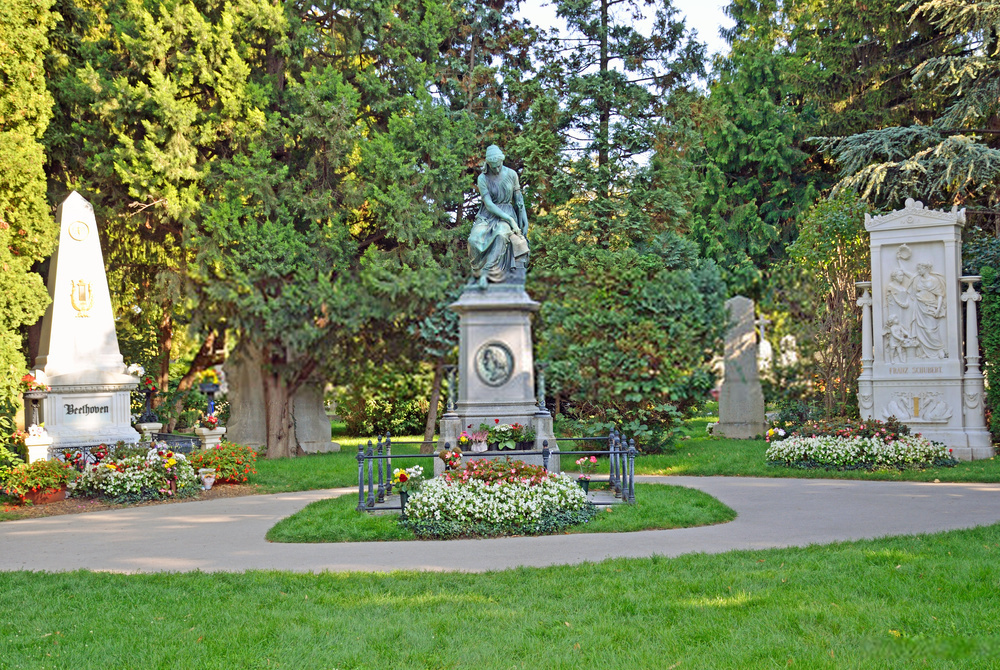 The Vienna Central Cemetery is one of the largest cemeteries in the world. More than 300,000 graves are in its central cemetery. It occupies 2.5 million square meters. Similarly, Vienna has some 52 suburban Cemeteries. The cemetery is not situated in the city of Vienna but on the outskirts.
The Vienna Central Cemetery is one of the largest cemeteries in the world. More than 300,000 graves are in its central cemetery. It occupies 2.5 million square meters. Similarly, Vienna has some 52 suburban Cemeteries. The cemetery is not situated in the city of Vienna but on the outskirts.
30. Most popular scientists that belong from Austria
The father of Psychoanalysis- Sigmund Freud, Christian Doppler who invented the doppler effects, The father of modern genetics- Gregor Mendel, Wolfgang Amadeus Mozart-great composers in the history of Western music, Beethoven- Produced Symphony No 9 in D minor, Ernst Mach- introduced the system of Mach number (speed of sound is measured in Mach number), Wolfgang Puck- a famous chef of 21 century are some of the famous scientists that belong from Austria.
These are some interesting facts about Austria.
Austria facts for kid
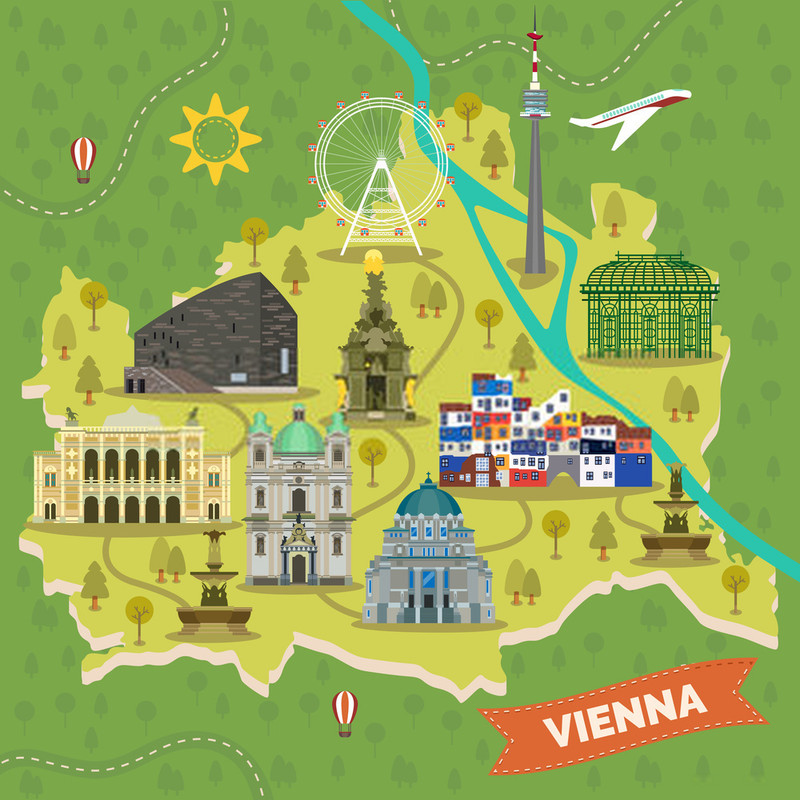
- Vienna is the capital of Austria as well as the largest city.
- The National Bird of Austria is Barn Swallow.
- The National flower of Austria is Edelweiss.
- Austria is called the winter sports capital of Europe.
- The National tree of Austria is Beech Tree.
- The famous historic cities, villages, and magnificent scenery of the Alps are the Austrian identity.
- Woods and Meadows covered around 60% of Austria's total land. Similarly, forests account for 2/5th of the country.
- The National Fruit of Austria is Apple
- The second largest river in Europe is the Danube River after the Volga River and it flows through Austria, Hungary, Croatia, Slovakia, Romania, Bulgaria, Serbia, Moldova, and Ukraine. The Danube River originated in Germany. Danube River is approximately 2880 km long from Germany to Ukraine and it empties into the black sea. It is only the river in the world that flows through ten countries.
- 2/3 of the country's land is above 500 meters.
- The highest waterfall in Austria is Krimml Falls and it is also the highest waterfall in Central Europe.
- Football is the National sport of Austria.
- The capital city of Austria is Vienna.
- Ibex is a species of mountain goat in Austria and found in the Alps.
- The lowest point in Austria is the Neusiedlersee and it is 115 m above sea level.
- The national animal of Austria is Eagle.
- In some parts of the country, it rains a lot and almost more than 200 times a year.
- Austria is one of the most populous countries in Europe.
- More than 20% of women and 50% of men are overweight in Austria. These stats are the highest in Europe.
- Austria also has one of the oldest flags in the world.
Frequently Asked Question
1. What are 4 Interesting facts about Austria?
1. There are many languages spoken in Austria but German is the official language of Austria. Some of the other languages spoken in Austria are Slovene, Croatian, Hungarian, and Burgenland Croatian. Most local people speak Austrian German in Austria which is a dialect of the German language.
2. Most Austrian learn to ski in their early years of life.
3. Austria is ranked at 24th spot on the Human Development Index.
4. On 14 December 1955, Austria joined the United Nations Organization and become the 70th member. Similarly, Austria is also one of the founding members of the Organisation for Economic Co-operation and Development. The organization has 35 member countries to this day.
These are some interesting facts about Austria.
2. Did you know the facts about Austria?
1. In 1995 Austria joined the European Union and in the same year, Finland and Sweden also joined the European Union.
2. It is a part of Borderless Europe so many students come from various European countries to study in Austria and vice versa.
3. Bavaria ( South Germany) is close to Austria so the cultures are relatively similar in both countries.
4. Ethnic Austrians constitute the vast majority of the population in Austria.
5. In the European Union nation, Austria is the only country that is not a member of NATO.
6. St. Peter Stiftskeller is the world's oldest still-operating restaurant which is in Austria. It was established in 803 and now it is still operational. This restaurant crosses for more than 1200 years and is still operational.
7. Funerals have become an expensive obsession in Austria. People can spend their money on their special send-off.
8. Freedom of religion is a fundamental right in Austria.
9. One of the top recyclers in Europe and the country recycles almost 64% of the waste it produces.
10. Grocery and Retail shops are mostly closed on Sunday.
These are some interesting facts about Austria.
3. What is Austria famous for?
Austria is famous for its high mountainous as well as the dense forest. It is one of the most densely forested countries in central Europe. Similarly, the people of Austria are very hospitable they enjoy drinking, eating, and chit-chatting with friends and relatives.
Furthermore, Austria is also famous for its highest standards of living, and the people of this country are most patriotic and many of them derive their identity from the state/region they belong to.
These are some famous facts about Austria.
4. How old is Austria?
Austria is created in 976. The first record showing the name of Austria is from 996. In 1156, the Privilegium Minus elevated Austria to the status of a duchy. In the 14th and 15th centuries, Habsburgs began to accumulate other states and make Austria.
5. Some facts why Austria-Hungary, Germany, and Bosnia are good
Austria-HungaryAustria-HungaryAustria-Hungary1. In these countries, people work the longest hours- 45 hours per week and the people of these countries are very much hard-working compared to other European Union nations.
2. Punctuality is a valuable trait in Hungary, Germany, Austria, and Bosnia.
3. People stay in a relationship longer than in other countries and most of them are hospitable.
These are some interesting facts about Austria as well as other countries that are good in Europe.
6. What is Austria known for in food?
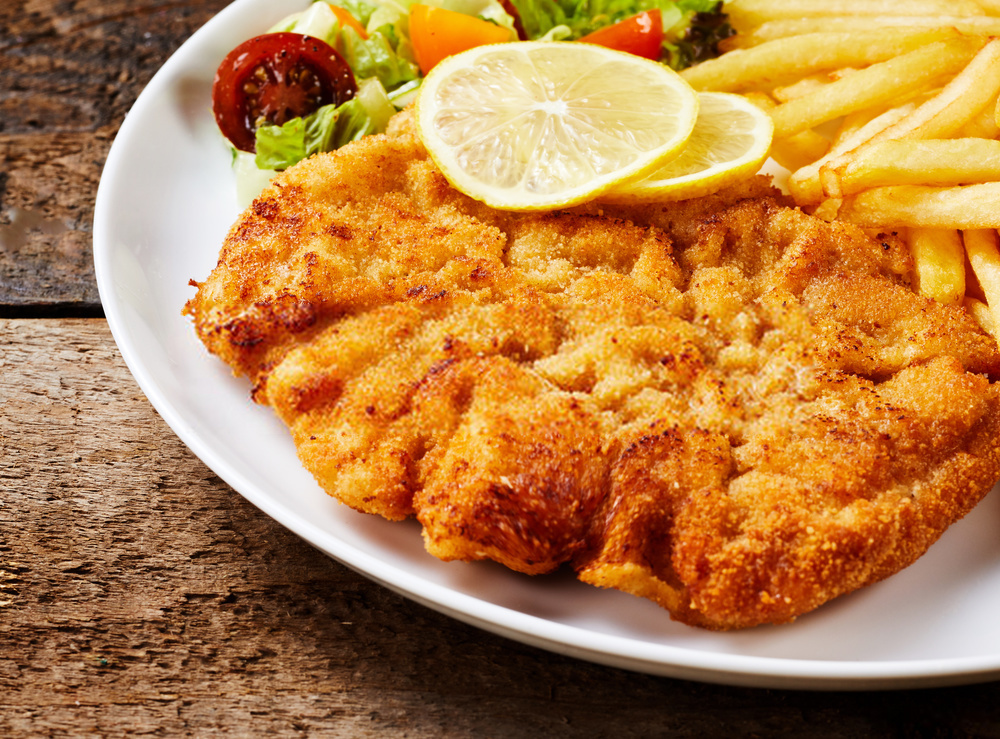
The food of Austria is influenced by Hungarian, German and Italian traditions. Austria's famous dish is Wiener Schnitzel which are cutlets of veal, pounded thin dusted with egg and breadcrumbs, and then fried.
Sweet desserts and cake- Sachertorte is a famous chocolate cake that is highly eaten chocolate cake in Austria. Strudel which is a pastry roll filled with apples and cottage cheese is the home of Austria. Similarly, Potatoes are very much popular in Austria. The potatoes are served sliced and fried and pan fried as well.
Furthermore, Gelato one of the famous ice creams can be found everywhere in the country. Veal, Beef, and Pork are also some of the most favourite Austrian dishes.
These are some interesting facts about Austrian foods.
In conclusion
In this article, we discuss some of the interesting facts about Austria. Austria is one of the best countries to visit. This county is very much rich in culture and tradition. Similarly, if you planning to visit this country in the coming day then go in the summer. In Summer the climate is very much clean and you can enjoy it in the summer rather than winter. Furthermore, if you want to celebrate your Christmas in Austria then you never forget such a great celebration lifetime. During Christmas the environment here is awesome and most of the tourists come to celebrate their Christmas in Austria because of the awesome environment. If you already visited this country then please share your experience with us by commenting below.




































